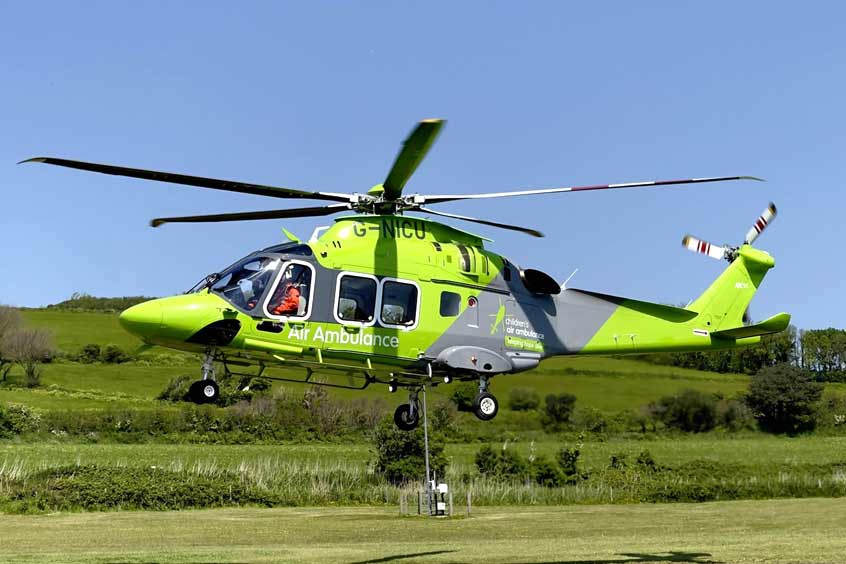Why visit ACE ’25?

The Air Ambulance Service (TAAS) has appointed Peta Wilkinson as the new chief executive of the UK lifesaving charity. Wilkinson will provide leadership and guidance to ensure the continued development and growth of the charity, which this year marks the 20th anniversary of its first lifesaving mission.
TAAS, which operates the national Children's Air Ambulance and local air ambulance services for Warwickshire, Northamptonshire, Derbyshire, Leicestershire and Rutland, has grown significantly over the past two decades. From a single aircraft, it now operates a network of four helicopters and two critical care cars while ensuring lifesaving, critical care is provided 24 hours a day, seven days a week.
Wilkinson joins the charity at an exciting time for the organisation as it implements a new five-year strategy designed to continually advance rapid response and critical care services to patients, while growing the awareness and support required to deliver pre-hospital emergency care to those who need it most.
Commenting on her appointment, she says: “I am delighted to be joining the team at The Air Ambulance Service. I have already been tremendously impressed by the passion, dedication and commitment that everyone shows for the vital, lifesaving work the charity undertakes. I have spent my working life in healthcare and the voluntary sector and am very honoured to be a part of TAAS' future given the important role the charity provides in the delivery of critical care and enhancing patient outcomes.”
Wilkinson has over 25 years of experience as a CEO and board member in the healthcare and not-for-profit sectors. Peta has led a diverse selection of health and social care institutions, including Willen Hospice, Enham Trust, Uttlesford PCT and The Terrence Higgins Trust and has championed change and development in all these organisations. She has also been a trustee of Sue Ryder.
Professor Bob Allison CBE, who is chair of trustees, says: “We are delighted that Peta is joining us. Her success in past roles, impressive leadership experience, her understanding of the challenges and opportunities at The Air Ambulance Service, and her commitment to our values will ensure the charity continues to go from strength to strength. Peta clearly has an excitement and passion for TAAS, and what she can offer us as she takes on this hugely important role. I look forward to working with Peta when she joins us as CEO.”
On 10 May 2013, the national Children's Air Ambulance (TCAA) took to the skies as the only helicopter dedicated to transferring critically ill babies and children across the UK, undertaking its first vital patient transfer using an AgustaWestland 109 helicopter.
Baby Theo was born at Scarborough Hospital in May 2013 to his parents Denisa Mikova and Lee Ratchford. But what should have been the happiest moment of their lives, soon became a nightmare for the new parents as baby Theo was diagnosed with a life-threatening condition.
Tiny Theo weighed just less than 5lbs when he was delivered by caesarean section, after a very difficult labour for Denisa, who had to be anaesthetised during the birth of her son. When Denisa awoke following the surgery, she and Lee were told by doctors that Theo's oesophagus was not connected to his stomach properly and that he would need vital surgery if he was to survive.
Scarborough Hospital did not have the specialist surgeons required to perform the necessary operation, and his parents were told that he would need to be transferred to Hull Royal Infirmary to receive the lifesaving treatment needed, which was over an hour's drive away.
“We thought we would be going by ambulance,” says Lee, “but then the helicopter came for him.”
The Children's Air Ambulance helicopter was activated from its Coventry base, collected the clinical partner team, Embrace, and flew to Scarborough Hospital to pick up little Theo. Once Theo was on board, the flight to Hull took just 15 minutes, a journey which would have taken over an hour by road, without including traffic conditions during rush hour. I t's cases like this where every minute can and does count.
Since Theo's flight, the Children's Air Ambulance has developed over the years into the pioneering transfer service it is today. It's changing the face of paediatric and neonatal care through the high-speed transfer of critically ill babies and children and flying them from one hospital to another for specialist care.
TCAA's fleet has progressed to two new clinically designed AgustaWestland 169 helicopters, supplied by Sloane Helicopters Ltd, with one based at London Oxford Airport and the other at Gamston (Retford) Airport, providing flying intensive care units for babies and children.
The charity works with 11 NHS paediatric retrieval teams across the UK, enabling them to bring their specialist equipment on board to safely transfer their patients from one hospital to another. If a child is too sick to fly, then the Children's Air Ambulance can fly a specialist team directly to them.
This year the charity celebrates its 10th anniversary of the lifesaving service which without public support, simply wouldn't be here. Every donation it receives goes a long way towards the £3,500 needed to keep the green helicopters flying.
What better way for the charity to celebrate 10 years than its first-ever extra corporeal membrane oxygenation (ECMO) patient transfer. That's not all; the charity has also carried out over 720 patient transfers and developed its new neonatal transport systems (incubators). These systems have been designed especially for its helicopters and are the first incubators on a rotary-wing aircraft in England.
The Children's Air Ambulance charity is continually looking at ways to increase support to the NHS and the clinical teams it works alongside. By introducing pioneering developments from generous public donations, the service is really leading the way in paediatric and neonatal aeromedical transfers.